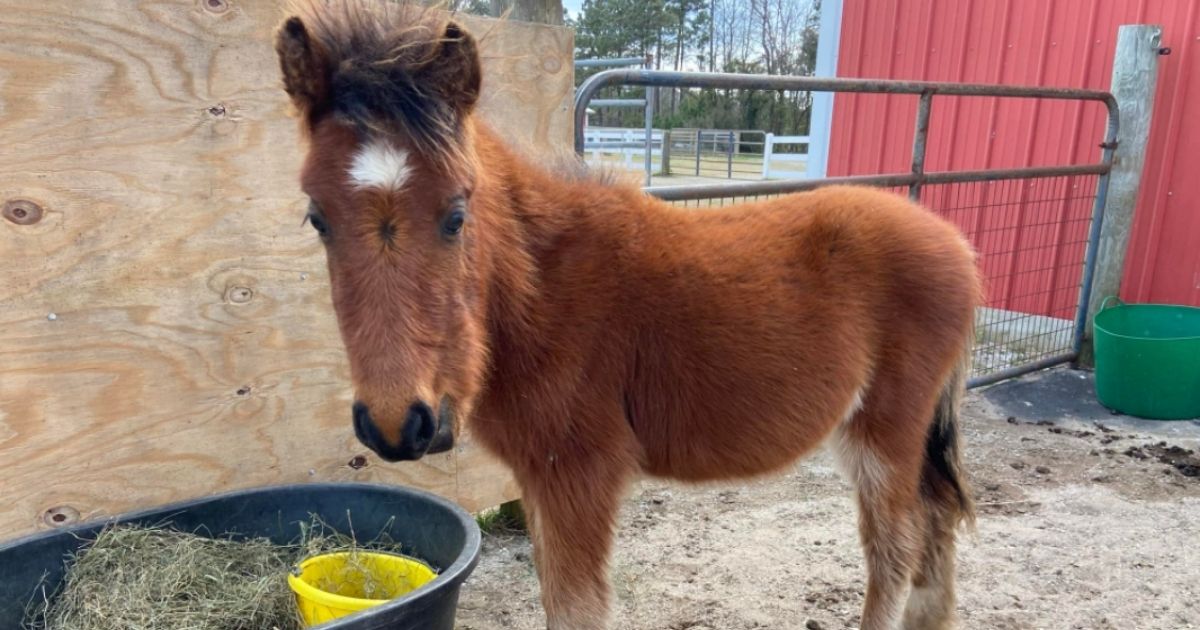There are still places where wild horses run free, and in those places there are groups dedicated to helping ensure that things stay that way.
The Corolla Wild Horse Fund supports a herd of wild horses in Corolla, North Carolina, that have made the area their home for hundreds of years.
“The wild horses of the Currituck Outer Banks have survived nearly 500 years of fierce Nor’easters and hurricanes,” the group’s Facebook page states. “They are truly representative of the Outer Banks spirit — untamed and rugged.”
[firefly_embed]
[/firefly_embed]
While ultimately these groups hope to preserve the freedom of the horses they love, every once in a while, they’re required to step in to help.
This week that meant responding to reports of a baby horse that appeared to be in distress, wandering along a beach alone, thin and sick.
The colt’s name was Brio, and he was born last July. When staff spotted him, he was actively calling out to herd members, but they weren’t around, and neither was his mother.
Since Brio was old enough to be weaned, they held back to see if he would make his way back to the herd — but he didn’t, and things started to look grim for the horse.
[firefly_embed]
[/firefly_embed]
“Our staff closely watched Brio for a week, and while he did settle down and stop calling for his mom, he never moved very far from the place where he was first spotted,” the Corolla Wild Horse Fund shared on Facebook on Thursday. “Last weekend Rocky and the rest of the family were within eyesight of Brio several times, and he never showed any interest in them, nor they in him.
“On Monday morning, just over a week after he was first spotted, we saw that Brio was becoming weak and wobbly in his back legs, was lethargic, and had started to lose weight. It was clear that Brio was certainly not going to thrive on his own, and most likely would not survive.
[firefly_embed]
[/firefly_embed]
“We caught him and took him to our rescue farm on the mainland, where our vet met us immediately. He determined that Brio has pneumonia, and we discovered just how thin he had become (it’s hard to tell under all that hair, but once we got our hands on him we could feel every single one of his ribs and his hip bones). We are hopeful that the issues with his hind legs will be resolved with proper nutrition and corrective hoof trimming.”
Since arriving on the rescue farm, Brio has been prescribed antibiotics and might be getting X-rays within the next week. He also needs grooming and deworming, but the organization is being careful not to do too much at once.
The foal seems to be improving with proper care, though it’s clear he has experienced hardship, is underdeveloped and seems to be lacking proper social development.
[firefly_embed]
[/firefly_embed]
Because of all those factors, it’s likely in the foreseeable future that Brio will remain a resident at the farm, where he can be monitored, cared for and carefully introduced to other horses.
There’s also another mystery that has developed through all of this: No one seems to know where Brio’s mother is. Did she abandon him? Did she die?
They’re keeping an eye out for her, but for now their focus is on her baby.
“We will keep everyone updated on Brio’s progress, and appreciate your good vibes and prayers, your support, and your trust in us to do what’s best for him,” the group’s Facebook post concluded.
“He is a fighter, and we will continue to provide the best possible care for him.”
This article appeared originally on The Western Journal.
























